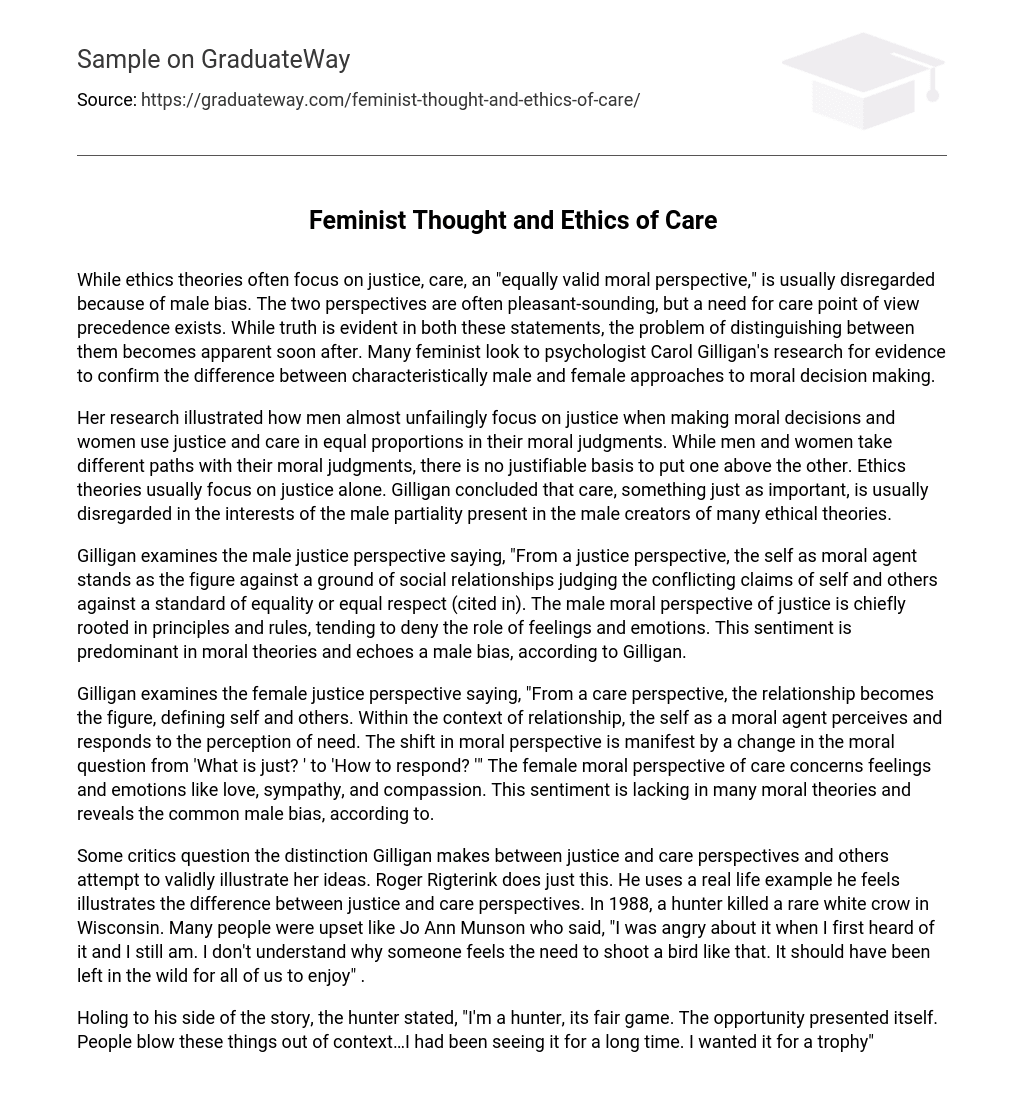Although ethics theories often prioritize justice, the care perspective is often dismissed due to its association with a biased male point of view. Both perspectives have their merits, but there is a pressing need to give priority to the care perspective. While both statements hold some truth, the challenge lies in distinguishing between them. Many feminists turn to psychologist Carol Gilligan’s research as evidence to support the distinction between typically male and female approaches to making moral decisions.
The research conducted by Gilligan demonstrates that men primarily rely on justice when making moral decisions, while women use both justice and care equally. Although men and women have different approaches to moral judgment, it is unjustified to prioritize one over the other. Typically, ethics theories predominantly emphasize justice, neglecting the significance of care. Gilligan concluded that the male bias embedded in the creators of many ethical theories overlooks the crucial aspect of care.
Gilligan discusses the male perspective on justice and argues that it revolves around the individual as a moral agent making judgments based on social relationships. This perspective evaluates conflicting claims of self and others in terms of equality or equal respect. It primarily relies on principles and rules while disregarding emotions and feelings. Gilligan suggests that this inclination towards objectivity and detachment reflects a bias towards masculinity in moral theories.
In her examination of the female justice perspective, Gilligan argues that the figure of the relationship defines both self and others. She emphasizes that within the context of this relationship, individuals perceive and respond to the perception of need, thus shifting their moral perspective from a focus on justice to a focus on response. Gilligan further asserts that the moral perspective of care, which encompasses emotions such as love, sympathy, and compassion, is often overlooked in traditional moral theories due to a common male bias.
Some critics question Gilligan’s distinction between justice and care perspectives, while others seek to illustrate her ideas. Roger Rigterink accomplishes this by using a real-life example involving a hunter in Wisconsin who killed a rare white crow in 1988. The incident caused distress for many individuals, including Jo Ann Munson, who expressed anger and confusion towards the hunter’s actions. Munson stated, “I was angry about it when I first heard of it and I still am. I don’t understand why someone feels the need to shoot a bird like that. It should have been left in the wild for all of us to enjoy.”
According to the hunter, he justified his actions by claiming, “I am a hunter and it was fair game. The opportunity came up and often these things are exaggerated… I had been observing it for a while and wanted it as a trophy.” After sharing the incident, Rigterink asked his students for their thoughts. Some students supported the hunter’s actions, arguing that there were no laws against them. This viewpoint reflects a concept of justice centered on adhering to rules and respecting rights. Conversely, other students condemned the hunter as thoughtless, insensitive, and disagreeable.
These students employ a care approach that appeals to the insensitive and thoughtless aspect of the hunter’s action. Rigterink uses this case because he believes that the perspectives of justice and care are incompatible. Although a clear distinction between care and justice emerges in this instance, critics question Rigterink’s interpretation of the findings. He assumes that the hunter’s action was inherently just due to legal regulations. This perspective contains elements of Utilitarianism and Kantian philosophy. However, if these theories are applied, a duty to care or the attainment of the greatest utility through a caring dimension also become part of the equation.
According to Barcalow’s analysis (p. 201), Rigterink’s findings are challenged. The question arises whether there is a distinction between the moral language and logic of males and females, and if sex or gender influences moral reasoning. There are various traits that define ethical behavior in both men and women. Men tend to use language focused on causing harm or benefiting others, basing their reasoning on the notion that they should engage in actions that assist those involved in a specific situation. Thus, the moral realm can be seen as being akin to the public domain of law and contract.
The main ethical duty is to avoid unfairness; being impartial and respectful are important qualities. For women, morality is deeply subjective. It is within the intimate and personal familial and friendly connections that we find the blueprint for other relationships. The main moral responsibility is to prevent harm, offer assistance to those in need, and not abandon them. Being caring and compassionate are crucial virtues. Kohlberg proposed that the pinnacle of moral development is when an adult is guided by their own moral principles and a sense of justice, rather than societal expectations.
Kohlberg’s research revealed that women typically do not achieve this particular stage of development, leading him to conclude that they are morally less developed or deficient. On the other hand, Freud argued that women base their moral judgments on personal relationships rather than a sense of justice, which he considered to be a lesser form of morality. Freud further contended that women are morally inferior to men. Various psychologists have conducted research on this topic, and it has been observed that any disparities in moral beliefs between men and women can be attributed to social status and life experiences rather than gender.
Nel Nodding argues that the ethics of care is a viable and valuable alternative to traditional morality. She suggests that ethics has historically been guided by LOGOS, the masculine spirit, but a more natural and potentially stronger approach would be through EROS, the feminine spirit. According to Nodding, moral decisions are made in real-life situations, and our ethics are rooted in our recognition of and desire for connection with others. The fulfillment we experience from caring for others reinforces our commitment to the ethical ideal of being a caring individual.





